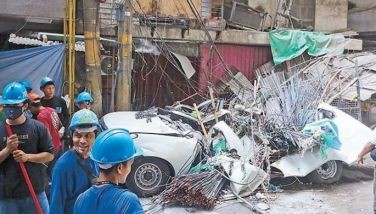Japan not buying World War II soldiers' remains - embassy
MABALACAT, Pampanga, Philippines – The Japanese embassy has debunked reports that skeletal remains of Filipinos dug up from local graves are being passed off as those of Japanese soldiers who died in the country during World War II.
In a letter to The STAR, Motohiko Kato, minister and deputy chief of mission of the Japanese embassy, also said the Japanese government is not paying for the remains of the Japanese soldiers, contrary to reports that an alleged Tokyo-based syndicate has been shelling out P1,000 per set of bones.
“For the collected remains of Japanese soldiers in the Philippines, we respect the legal procedure in the Philippines,” Kato said.
Kato said officials of the National Museum have been actively participating in locating and identifying the remains of Japanese soldiers.
Kato was reacting to an allegation of Japanese businessman Koji Nakamura who informed Mabalacat, Pampanga tourism officer Guy Hilbero that a group that he identified as “Ken Tai” has allegedly been buying skeletal remains, including those supposedly belonging to deceased Filipinos, for P1,000 per set of bones.
Hilbero was one of the founders of the Kamikaze shrine in Mabalacat town where the Kamikaze suicide squad of the Japanese imperial forces was founded during World War II.
Nakamura expressed doubts on the authenticity of the skeletal remains reportedly forwarded by the group to Japan’s Ministry of Health, Labor and Welfare.
Kato, however, said, “In our understanding, Kuentai, whose activities are under the guidance of the Japanese government, has never bought the collected bones.”
Kato said Japan’s Ministry of Health, Labor and Welfare has requested Kuentai, a non-profit organization, to assist in the retrieval of the skeletal remains of Japanese soldiers in the Philippines “in the Japanese fiscal year 2009 and 2010, from April 2009 to March 2010.”
“The Japanese government has undertaken the verification of bones in the most careful manner in close cooperation with the Philippine government,” Kato said.
“Please note that the procedures have been developed as a result of various collected remains from collectors or informants duly notarized. Comments or advices are requested as necessary from local residents living in the area for a long time,” Kato added.
After such procedures, Kato said authorized representatives of the National Museum, which is under the Office of the President, and representatives of Japanese government missions “review and examine the remains.”
“Thereafter, the National Museum representative issues a certification recognizing the collected remains as the Japanese soldiers’ remains. Finally we send the said remains back to Japan with the certification,” Kato said.
“The Japanese government has never bought the collected remains from anyone,” Kato said.
“It should be recognized by the Filipino public that the Japanese government received the cooperation of the National Museum in searching for the remains of Japanese soldiers in the country,” he added.
At this time of the year, the Japanese people are preparing for their annual ancestral ceremony called Bon held either in July or August, which, along with the New Year’s celebration, is considered to be one of the two most important observances in Japan.
During the Bon ceremony, family members go back to their parental homes to honor their dead who are believed to return there at this time.
- Latest
- Trending
























